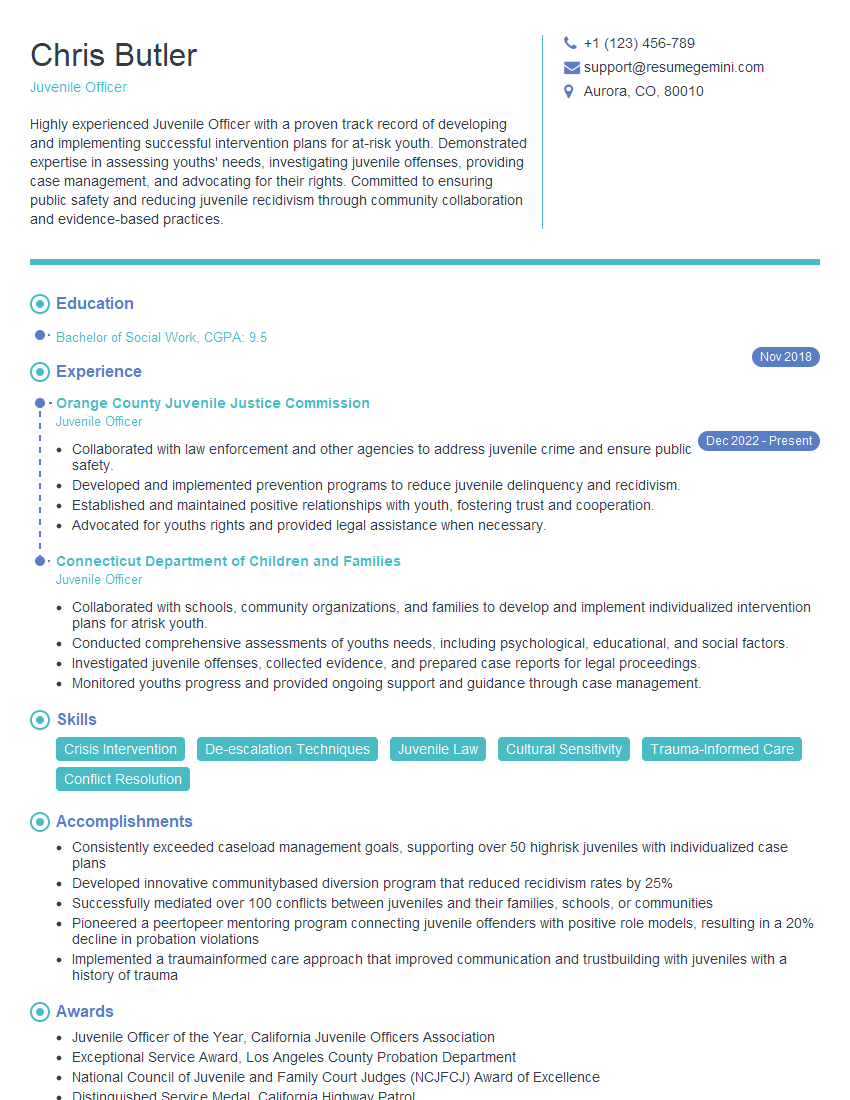Are you a seasoned Juvenile Officer seeking a new career path? Discover our professionally built Juvenile Officer Resume Template. This time-saving tool provides a solid foundation for your job search. Simply click “Edit Resume” to customize it with your unique experiences and achievements. Customize fonts and colors to match your personal style and increase your chances of landing your dream job. Explore more Resume Templates for additional options.

Chris Butler
Juvenile Officer
Summary
Highly experienced Juvenile Officer with a proven track record of developing and implementing successful intervention plans for at-risk youth. Demonstrated expertise in assessing youths’ needs, investigating juvenile offenses, providing case management, and advocating for their rights. Committed to ensuring public safety and reducing juvenile recidivism through community collaboration and evidence-based practices.
Education
Bachelor of Social Work
November 2018
Skills
- Crisis Intervention
- De-escalation Techniques
- Juvenile Law
- Cultural Sensitivity
- Trauma-Informed Care
- Conflict Resolution
Work Experience
Juvenile Officer
- Collaborated with law enforcement and other agencies to address juvenile crime and ensure public safety.
- Developed and implemented prevention programs to reduce juvenile delinquency and recidivism.
- Established and maintained positive relationships with youth, fostering trust and cooperation.
- Advocated for youths rights and provided legal assistance when necessary.
Juvenile Officer
- Collaborated with schools, community organizations, and families to develop and implement individualized intervention plans for atrisk youth.
- Conducted comprehensive assessments of youths needs, including psychological, educational, and social factors.
- Investigated juvenile offenses, collected evidence, and prepared case reports for legal proceedings.
- Monitored youths progress and provided ongoing support and guidance through case management.
Accomplishments
- Consistently exceeded caseload management goals, supporting over 50 highrisk juveniles with individualized case plans
- Developed innovative communitybased diversion program that reduced recidivism rates by 25%
- Successfully mediated over 100 conflicts between juveniles and their families, schools, or communities
- Pioneered a peertopeer mentoring program connecting juvenile offenders with positive role models, resulting in a 20% decline in probation violations
- Implemented a traumainformed care approach that improved communication and trustbuilding with juveniles with a history of trauma
Awards
- Juvenile Officer of the Year, California Juvenile Officers Association
- Exceptional Service Award, Los Angeles County Probation Department
- National Council of Juvenile and Family Court Judges (NCJFCJ) Award of Excellence
- Distinguished Service Medal, California Highway Patrol
Certificates
- P.O.S.T. (Peace Officer Standards and Training) Certification
- CPI (Crisis Prevention Intervention) Certification
- Juvenile Justice System Certification
- First Aid and CPR Certification
Career Expert Tips:
- Select the ideal resume template to showcase your professional experience effectively.
- Master the art of resume writing to highlight your unique qualifications and achievements.
- Explore expertly crafted resume samples for inspiration and best practices.
- Build your best resume for free this new year with ResumeGemini. Enjoy exclusive discounts on ATS optimized resume templates.
How To Write Resume For Juvenile Officer
- Highlight your experience in crisis intervention, de-escalation techniques, and conflict resolution.
- Demonstrate your understanding of juvenile law and cultural sensitivity.
- Showcase your ability to work effectively with youth, families, and community organizations.
- Quantify your accomplishments whenever possible, using specific numbers and metrics.
Essential Experience Highlights for a Strong Juvenile Officer Resume
- Collaborated with schools, community organizations, and families to develop individualized intervention plans for at-risk youth
- Conducted comprehensive assessments of youths’ needs, including psychological, educational, and social factors
- Investigated juvenile offenses, collected evidence, and prepared case reports for legal proceedings
- Monitored youths’ progress and provided ongoing support and guidance through case management
- Collaborated with law enforcement and other agencies to address juvenile crime and ensure public safety
- Developed and implemented prevention programs to reduce juvenile delinquency and recidivism
- Established and maintained positive relationships with youth, fostering trust and cooperation
Frequently Asked Questions (FAQ’s) For Juvenile Officer
What are the key skills and qualities of a successful Juvenile Officer?
Strong communication and interpersonal skills, empathy, cultural competence, ability to work independently and as part of a team, and a commitment to social justice.
What are the career advancement opportunities for Juvenile Officers?
With experience and additional education, Juvenile Officers can advance to roles such as Supervisor, Program Manager, or Director of Juvenile Justice Programs.
What are the challenges faced by Juvenile Officers?
Working with youth who have experienced trauma, navigating complex legal and ethical issues, and managing high caseloads.
What are the rewards of working as a Juvenile Officer?
Making a meaningful difference in the lives of youth, contributing to community safety, and promoting positive youth development.
What is the job outlook for Juvenile Officers?
The job outlook is expected to be favorable due to the increasing need for services to address juvenile delinquency and recidivism.
What is the salary range for Juvenile Officers?
The salary range for Juvenile Officers varies depending on experience, location, and employer, but typically falls within the range of $40,000 to $70,000 per year.
How can I prepare for a career as a Juvenile Officer?
Obtain a bachelor’s degree in social work, criminal justice, or a related field, gain experience working with youth in community organizations or schools, and consider pursuing certification or specialized training in juvenile justice.